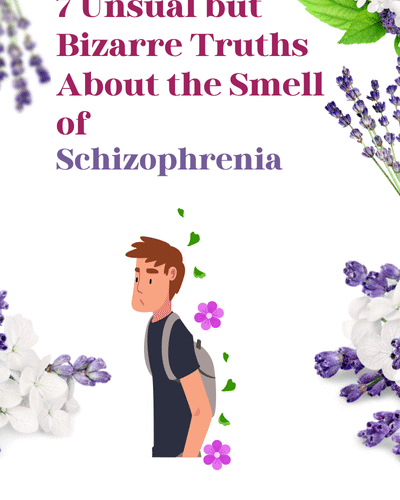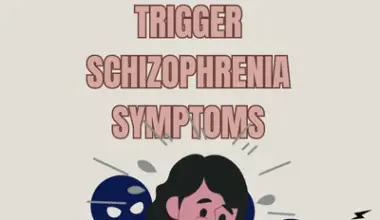What does schizophrenia smell like? For years, researchers and caregivers have noticed that people with schizophrenia sometimes have a distinct, unusual body odor. It’s not just a matter of hygiene; this scent has been linked to biological changes in the body.
Studies suggest that this unique smell could be tied to altered metabolism or brain chemistry, offering a bizarre but fascinating glimpse into how mental illness might affect the body in ways we don’t fully understand yet.
In this blog post, we will be unraveling truths on the smell of schizophrenia, how it works, its symptoms, and its strange sensory experiences.
Table of Contents
ToggleAt What Age Does Schizophrenia Start?
Schizophrenia is a chronic mental health disorder that affects how a person thinks, feels, and behaves.
It often involves hallucinations, delusions, disorganized thinking, and reduced emotional expression.
Schizophrenia typically begins between the ages of 16 and 30, often emerging in late adolescence or early adulthood. Men usually develop symptoms earlier, between 18 and 25, while women begin showing signs between 25 and 30.
This initial period, known as the prodromal phase, involves subtle shifts in thinking, mood, or behavior. Though rare, schizophrenia can also begin in childhood or after age 40, with childhood-onset being particularly severe and requiring prompt, intensive treatment.
In both early and late-onset cases, symptoms like hallucinations, delusions, and social withdrawal may develop gradually, making early detection challenging.
 What are the first signs of schizophrenia smell?
What are the first signs of schizophrenia smell?
Schizophrenia smell isn’t like typical body odor caused by poor hygiene or sweat. Instead, it’s often described as musky, sweet, or slightly sour, a quality that’s hard to explain but noticeably different. The smell may become more apparent during episodes of intense mental stress or when symptoms start to develop.
One of the first signs connected to this unique scent involves a sudden change in personal odor that isn’t explained by lifestyle or hygiene changes.
Family members or close friends might notice that someone smells different even when they’re clean and well-groomed. This is not a formal symptom of schizophrenia, but it can act as a biological clue.
Some theories suggest that the scent comes from chemical changes in the body or skin, possibly linked to how the brain processes certain neurotransmitters or fatty acids. They found that people with schizophrenia may have higher levels of certain compounds in their sweat, particularly trans-3-methyl-2-hexenoic acid.
Although this research has never led to a reliable diagnostic tool, it raised interesting questions like: what does schizophrenia smell like in its earliest phases, and could this be a biological marker in the future?
What are three warning signs of schizophrenia?
One of the earliest warning signs of schizophrenia is delusional thinking. A person might strongly believe things that aren’t based in reality, such as thinking they’re being followed or that someone is trying to harm them. These beliefs can be very vivid and hard to challenge, even with evidence.
Another clear sign is hallucinations, especially hearing voices that aren’t real. These voices might comment on the person’s actions, insult them, or tell them what to do. While this may seem distressing, the person experiencing it might believe the voices are real.
A third important warning sign is social withdrawal and emotional flatness. Someone may start to avoid friends and family, lose interest in things they once enjoyed, and show little emotion or facial expression. These shifts in behavior may be subtle at first but become more noticeable over time.
Why do I have a strange smell coming from my body?
Unusual body odor can stem from various health-related factors, including poor hygiene, diet, infections, or underlying medical conditions.
Foods like garlic, onions, and spicy dishes can contribute to odor as they’re metabolized and released through sweat. When hygiene is neglected, bacteria on the skin can multiply, leading to an unpleasant smell.
Metabolic or hormonal imbalances are another common cause of unusual body odor. Conditions like diabetes, liver disease, and thyroid dysfunction can lead to distinct smells when waste products accumulate and are released through sweat or breath. For example, a fruity or ammonia-like scent may signal an underlying health issue.
Stress and mental health conditions can play a role. Chronic stress, anxiety, or certain psychiatric disorders may lead to excess sweating or chemical changes in the body that alter natural scent. If a strange odor persists without a clear cause, it’s essential to consult a healthcare provider for a thorough evaluation.
What Foods Should Schizophrenics Avoid?
People living with schizophrenia need to pay close attention to their diet, as certain foods can worsen symptoms or interfere with medications. Processed foods that are high in sugar, saturated fats, and artificial additives should be avoided.
These ingredients can trigger inflammation in the brain, which is thought to affect mood and cognitive function. While managing schizophrenia involves more than just food, a clean and balanced diet helps support mental clarity and emotional stability, something often overlooked when discussing mental health.
Interestingly, some researchers exploring what schizophrenia smells like believe poor diet may even influence the body’s biochemical signals, including scent.
Gluten and dairy are also common triggers. Although not everyone with schizophrenia reacts negatively to them. Gluten may contribute to inflammation and gut-brain imbalances, which are being studied about mental disorders.
Caffeine, alcohol, and foods high in sodium should also be limited. These can interfere with antipsychotic medications and increase anxiety, restlessness, or sleep disturbances, common issues in schizophrenia.
Maintaining balance in both body and brain starts with proper hydration, fiber-rich foods, and omega-3 fatty acids found in sources like fish and flaxseeds.
What Does Schizophrenia Smell Like, According to Research?
Schizophrenia research has explored many unusual aspects of the condition, including the possibility that it might be linked to a distinct body odor. Decades ago, scientists began to examine chemical changes in the sweat and skin oils of patients with schizophrenia.
One compound, trans-3-methyl-2-hexenoic acid, stood out for its strong, sour scent and was found more often in individuals diagnosed with the disorder. When researchers began asking what schizophrenia smells like, this compound became a point for understanding how the illness might affect the body in ways beyond just the brain.
Although modern psychiatry doesn’t rely on scent to diagnose mental illnesses, the idea still intrigues researchers today. Advances in technology and biochemical analysis continue to hint that the human body may release specific markers when brain function is severely altered.
In rare cases, caregivers or family members have reported detecting an unusual smell before behavioral symptoms became obvious. These accounts, along with scientific interest in what schizophrenia smells like, remind us that mental health conditions may show up in physical forms we are only beginning to understand.
 Is there a Specific body Odor Linked to Schizophrenia?
Is there a Specific body Odor Linked to Schizophrenia?
Studies suggest there may be a specific body odor linked to schizophrenia, although it’s not widely recognized in clinical practice. Some researchers have found that individuals with schizophrenia might emit a subtle, unusual scent that differs from typical body odor.
This scent has been described as slightly sweet, musty, or sour, difficult to define but consistently reported by close observers and caregivers. When scientists began exploring questions like what schizophrenia smells like, they discovered that certain chemicals in sweat could be altered in those with the disorder.
Can People with Schizophrenia Detect Their Scent?
Some individuals with the condition may become aware of changes in their body odor, especially during intense episodes or periods of stress. However, this awareness can be complicated by sensory processing differences often experienced in schizophrenia.
There have been reports suggesting that some people with schizophrenia develop a heightened sensitivity to smells, while others may lose the ability to recognize certain odors. This inconsistency makes self-detection unreliable.
Delusions or olfactory hallucinations, where individuals believe they smell things that aren’t there, can further confuse the perception of scent.
While someone with schizophrenia can notice a change in their scent, it’s not something they can consistently detect or rely on. The body odor sometimes associated with schizophrenia is believed to stem from metabolic changes, which may not always produce a smell strong enough to be obvious.
What Causes Changes in Body Odor in Schizophrenic Patients?
Changes in body odor among individuals with schizophrenia are believed to stem from several underlying biological and chemical processes. One major factor is altered metabolism.
Schizophrenia can affect how the body processes certain fatty acids and amino acids, which may lead to the release of unusual compounds through the skin. This metabolic imbalance can produce a distinct scent that’s been consistently noticed in some patients.
Another contributing factor is the body’s response to oxidative stress. People with schizophrenia often have elevated levels of oxidative compounds, which can break down cellular structures and release byproducts that influence body odor.
These byproducts, including specific acids and ketones, may give off a sour, musty, or even sweet smell. When researchers investigate what schizophrenia smells like, they frequently examine how these chemical changes in the body may create a scent profile unique to the disorder.
Hygiene and self-care practices, often impacted by the cognitive and emotional challenges of schizophrenia, can influence body odor. However, even when hygiene is well-maintained, many still report a lingering, strange scent that seems unrelated to cleanliness.
Olfactory Hallucinations in Schizophrenia
Olfactory hallucinations, or phantom smells, are a lesser-known but significant symptom of schizophrenia. People experiencing this type of hallucination may report smelling things that aren’t there, such as burning rubber, rotting food, or chemicals.
These phantom odors can feel incredibly real and often cause distress, confusion, or paranoia. The brain’s misfiring in regions that process scent may be responsible for these sensory misperceptions. Researchers suggest that disruptions in the olfactory bulb and limbic system play a role in these hallucinations.
Being attentive to olfactory hallucinations early may lead to better diagnosis and intervention. Though uncommon, this symptom should not be dismissed, especially when someone repeatedly describes strange smells without a physical source.
 How to Tell if Someone is Schizophrenic?
How to Tell if Someone is Schizophrenic?
Recognizing schizophrenia involves paying close attention to changes in behavior, emotions, and thinking. One of the first signs may be a sudden shift in how a person perceives reality. They might hear voices that aren’t there, believe things that aren’t true, or withdraw from social situations. These symptoms start subtly but grow stronger over time.
Other warning signs include disorganized speech, trouble focusing, or difficulty managing daily tasks. A person with schizophrenia may appear emotionally flat, avoid eye contact, or struggle to express themselves clearly. Sometimes, they may describe unusual sensory experiences, including odd smells.
Do Schizophrenics Have a Body Odor?
Some studies suggest that individuals with schizophrenia may emit a distinct body odor caused by changes in metabolism and stress-related chemical processes. This scent is not always noticeable to others.
Research using methods like gas chromatography-mass spectrometry (GC-MS) has identified unique compounds in the sweat and skin secretions of people with schizophrenia, hinting that body odor could reflect internal imbalances linked to the condition.
The specific smell reported is often described as musty, pungent, or similar to vinegar or stale sweat. However, not every person with schizophrenia will give off this odor. Factors like hygiene, medication, diet, and overall health all influence body scent.
What does schizophrenia smell like? 7 Unusual but Bizarre Truths About the Smell of Schizophrenia
These bizarre truths reveal just how complex and misunderstood the sensory aspects of schizophrenia are. They are;
-
Some People with Schizophrenia Report Smelling Things That Aren’t There
Olfactory hallucinations are real and distressing symptoms of schizophrenia. Individuals might smell smoke, chemicals, or rotting food when nothing is present. -
Scientists Have Detected Unique Body Odors in Schizophrenia Patients
Studies using advanced tools like gas chromatography-mass spectrometry (GC-MS) have revealed specific chemical compounds in the body odor of people with schizophrenia. -
The Odor Is Often Described as Musty or Acidic
Though not universal, some patients produce a distinct scent that others compare to vinegar, sweat, or even mold. -
Stress and Brain Chemistry Play a Role in the Scent
Mental stress and biochemical changes in the brain may cause the release of certain volatile compounds through the skin. -
Smell May Be a Clue for Early Detection
If researchers can consistently identify a scent linked to schizophrenia, it could become a non-invasive way to screen for early signs. Many hope that uncovering what schizophrenia smells like will lead to faster diagnoses. -
Not Everyone with Schizophrenia Has This Smell
The scent, if present, varies widely among individuals. Factors such as hygiene, medications, and diet also influence body odor, so there’s no answer to what schizophrenia smells like for everyone. -
People with Schizophrenia Sometimes Obsess Over Imaginary Smells
In some cases, individuals believe others can smell them or that a toxic odor surrounds them. This paranoia adds to the mystery behind what schizophrenia smells like, highlighting how deeply scent can be tied to delusions.
 Are Smell Deficits a Symptom or a Cause of Schizophrenia?
Are Smell Deficits a Symptom or a Cause of Schizophrenia?
Smell deficits in schizophrenia are widely considered a symptom of the disorder. Research shows that many individuals with schizophrenia experience problems with olfactory function; they may have trouble identifying, detecting, or distinguishing between smells.
These impairments often appear early, sometimes even before other clear symptoms like delusions or hallucinations, which has led scientists to explore them as potential early warning signs. Studies using brain imaging have found that people with schizophrenia often show changes in brain regions responsible for processing smell, such as the olfactory bulb and orbitofrontal cortex.
How Long Can a Schizophrenic Person Live?
A person with schizophrenia can live a long life, but studies show that their average life expectancy is 15 to 20 years shorter than general population. This gap is due to health issues, limited access to consistent medical care, and lifestyle challenges.
Conditions like heart disease, diabetes, and respiratory problems in people with schizophrenia can shorten their lifespan. Many individuals with schizophrenia experience periods of instability, making it harder to manage their health or maintain supportive relationships.
Lack of early diagnosis or treatment, sometimes due to the stigma attached to the disorder, can delay necessary medical care.
Where can Someone with Schizophrenia Live?
People with schizophrenia can thrive in various supportive housing environments, depending on the severity of their symptoms and the level of care they require. Many with mild to moderate symptoms live independently in apartments or homes, often with assistance from family, friends, or a caseworker.
Consistent routines, medication, and therapy play a key role in helping manage daily life. For those who need more structure, supervised group homes or residential treatment centers provide daily support.
These settings offer help with medication, meals, and social interaction. Staff are trained to handle psychiatric challenges and ensure that residents feel safe and stable.
In severe cases, long-term psychiatric hospitals or assisted living facilities might be necessary. These environments offer intensive medical and emotional support when symptoms interfere with everyday tasks.
What is the Odor of Schizophrenia?
The odor associated with schizophrenia isn’t something easily detected by the human nose, but scientific research has revealed that individuals with the condition may emit distinct chemical scents through their skin or breath.
These odors are believed to stem from metabolic changes linked to schizophrenia. Researchers have identified specific volatile organic compounds (VOCs) that appear more frequently in those with the disorder, raising the question What does schizophrenia smell like?
How Does Gas Chromatography-Mass Spectrometry Detect these Odors?
Gas chromatography-mass spectrometry (GC-MS) is a tool used by scientists to analyze complex chemical compounds, including odors.
GC-MS helps identify the unique substances released through sweat, skin, or breath that may be linked to the disorder. Researchers collect samples from individuals, usually sweat or sebum, and use GC-MS to separate and measure each component. This technique has helped bring clarity to the question many ask: what does schizophrenia smell like?
The process begins with gas chromatography, where the collected sample is vaporized and passed through a long, thin column. As the sample travels, its various chemical components separate based on how quickly they move through the column.
This step helps isolate different substances that may contribute to body odor. Many studies investigating what schizophrenia smells like focus on compounds like trans-3-methyl-2-hexenoic acid, which have been identified in higher levels in people with the condition.
Once the components are separated, mass spectrometry kicks in to identify and measure them. This part of the process breaks each molecule into fragments and records its mass and structure. It gives scientists a detailed chemical fingerprint of every substance in the sample.
GC-MS is not yet used in everyday psychiatric care, but its role in research continues to grow. The subtle odors once dismissed as unimportant are now being taken seriously, and studies exploring what schizophrenia smells like may eventually lead to early detection, personalized treatment, and a deeper understanding of how the brain and body are connected.
Can Loss of Smell be an Early Warning Sign of Schizophrenia?
Yes, loss of smell, also known as olfactory dysfunction, can be an early warning sign of schizophrenia. Research has shown that many individuals with the condition experience difficulty identifying, detecting, or distinguishing between odors, even before more obvious symptoms like hallucinations or disorganized thinking appear.
The sense of smell is processed in areas of the brain closely linked to emotion and memory, such as the olfactory bulb and prefrontal cortex, regions affected in schizophrenia. When these areas begin to function differently, it can impact how smells are interpreted or even noticed.
Studies show that even people at high risk of developing schizophrenia, such as close relatives of diagnosed patients, often score lower on smell tests. Although a loss of smell isn’t enough to diagnose schizophrenia on its own, it’s considered a potential biomarker, a subtle, early clue that something is changing in the brain.
 How Accurate are Odor-Based Tests for Diagnosing Schizophrenia?
How Accurate are Odor-Based Tests for Diagnosing Schizophrenia?
Odor-based tests for diagnosing schizophrenia are still in the experimental stage, and their accuracy is not yet strong enough for widespread clinical use. Some research has shown that people with schizophrenia may produce distinct body odors due to chemical imbalances, particularly involving volatile organic compounds.
The challenge is that body odor is influenced by numerous factors, such as diet, hygiene, medications, and other health conditions, making it hard to pinpoint a scent specific to schizophrenia. Although early research shows promise, smell-based detection methods are not yet reliable enough to replace traditional psychiatric evaluations.
Could Scent-Based Testing Lead to Early Intervention or Treatment?
Yes, scent-based testing could potentially lead to earlier intervention or treatment for schizophrenia. Research suggests that people with schizophrenia may emit a distinct odor due to shifts in body chemistry.
If scientists can reliably detect these scent markers, identifying what schizophrenia smells like could offer a new, non-invasive way to flag the condition before symptoms fully develop. Scent-based testing could provide early warning signs.
Can Schizophrenia be Cured if Caught Early?
While schizophrenia cannot be fully cured, early detection makes a significant difference in managing the condition. When diagnosed early, treatment can begin before symptoms become severe, increasing the chances of living a more stable and functional life.
Medications, therapy, and support services are most effective when introduced early in the progression. When treated early, many people with schizophrenia can experience long periods of recovery or remission. This means they may go months or even years with few or no symptoms, especially if they stick to their treatment plans.
How to Talk to a Schizophrenic?
When talking to someone with schizophrenia, it’s important to stay calm, patient, and nonjudgmental. People with this condition may experience hallucinations or delusions that seem very real to them, even if they sound strange to others.
Avoid arguing or trying to convince them that their beliefs are wrong. Instead, focus on listening with empathy. Use clear, simple language when you speak. Long sentences or fast speech can be confusing, especially if the person is struggling to process thoughts. Ask direct questions and give them time to respond.
For example, instead of asking, “How are you feeling about everything that happened yesterday?” you might say, “Are you feeling okay today?” This approach not only helps with communication but also allows for more accurate observation.
If their behavior becomes dangerous or unpredictable, seek professional help immediately. Schizophrenia is a medical condition, not a choice. Avoid labels or negative language, and remember that support from friends and family can make a huge difference.
What Are the Five Symptoms of Schizophrenia?
Schizophrenia is a complex mental health condition characterized by five key symptoms that impact how a person thinks, feels, and behaves.
The first and most widely recognized symptom is hallucinations. These often involve hearing voices that aren’t there, but can also include seeing, smelling, or feeling things others do not.
The second major symptom is delusions, firmly held false beliefs despite clear evidence to the contrary. A person might believe they’re being watched or possess special powers.
Another symptom is disorganized thinking, often reflected in speech that jumps from one idea to another without a logical connection. Conversations may become confusing or hard to follow, making communication difficult.
The fourth symptom, negative symptoms, involves a loss of normal functions. These may include reduced emotional expression, low motivation, and social withdrawal. Often mistaken for depression or laziness, these symptoms can be difficult to detect early.
The final symptom is cognitive impairment, which affects memory, attention, and decision-making. Tasks like organizing, remembering details, or following conversations can become extremely challenging.
 Positive Symptoms of Schizophrenia
Positive Symptoms of Schizophrenia
Positive symptoms of schizophrenia are behaviors or experiences that are added to a person’s normal way of functioning. These include hallucinations, delusions, and disorganized thinking. Another common positive symptom is disorganized speech and behavior.
A person might speak in a way that’s difficult to follow, jump between unrelated topics, or behave in unpredictable ways. While positive symptoms are usually the most visible and alarming, they also respond well to medication and early treatment.
Negative Symptoms of Schizophrenia: Things That Might Stop Happening
Negative symptoms of schizophrenia involve the loss of normal emotions, behaviors, and motivation, rather than the appearance of unusual or bizarre actions.
A person may show a flat face, speak very little, or lose energy to start everyday tasks. They might stop laughing at jokes, skip meals, or neglect personal hygiene, which sometimes leads people to wonder what schizophrenia smells like when self‑care routines fade.
Friends and family may notice the individual no longer enjoys hobbies, avoids conversation, or spends long hours isolated in bed. Work or school performance often suffers as clear thinking, focus, and planning abilities are reduced.
What Happens if Schizophrenia Goes Untreated?
If schizophrenia goes untreated, the condition can worsen over time, leading to more intense symptoms and severe disruptions in daily life. Without proper care, hallucinations and delusions can become more frequent and harder to manage. A person might lose touch with reality completely, making it difficult to work, study, or maintain relationships.
Untreated schizophrenia often leads to social withdrawal and isolation. Many individuals stop engaging with family or friends, avoid public places, and lose interest in activities they once enjoyed. Over time, basic responsibilities like eating, bathing, or keeping a job may become impossible.
This withdrawal can result in poor hygiene, which sometimes raises questions like what schizophrenia smells like, especially when people notice unusual body odors that weren’t present before.
There are also serious health risks linked to untreated schizophrenia. The stress and confusion caused by the illness can lead to substance abuse, self-harm, or even suicide. Physical health may suffer due to neglect, malnutrition, or lack of medical attention.
Antipsychotic medication, therapy, and support from loved ones can stabilize symptoms and give people with schizophrenia a real chance to thrive.
 Is the Chemical in Sweat and Loss of Smell a Sign of Schizophrenia?
Is the Chemical in Sweat and Loss of Smell a Sign of Schizophrenia?
Recent research suggests that certain chemicals found in sweat may be linked to schizophrenia. These chemical compounds, known as volatile organic compounds (VOCs), are released through the skin and can vary depending on a person’s mental or physical state.
In some individuals with schizophrenia, these compounds form a unique scent profile. In addition to changes in sweat composition, many people with schizophrenia also experience a reduced or altered sense of smell, known as olfactory dysfunction. This loss of smell is not just a minor symptom; it may point to early brain changes associated with the condition.
Researchers studying what schizophrenia smells like have found that those who lose their ability to detect certain scents often show other early signs of cognitive decline or sensory misperception, making it a useful warning sign for clinicians.
Does Schizophrenia Involve Unique Smell Deficits?
Yes, schizophrenia often involves distinct smell-related problems that set it apart from other mental health conditions. Many individuals with schizophrenia have difficulty identifying, detecting, or distinguishing odors, even when no other sensory issues are present.
These unique deficits in the sense of smell are believed to be connected to changes in brain regions responsible for processing scent. Studies have shown that these olfactory impairments may appear early, even before more obvious symptoms like delusions or hallucinations.
People with schizophrenia might struggle to recognize everyday scents such as smoke, perfume, or spoiled food. In some cases, they may report phantom smells that others cannot detect. These odd sensory experiences raise the question of what schizophrenia smells like, not just in terms of body odor but also how those with the condition perceive smells differently from others.
The uniqueness of these smell deficits is gaining attention as a possible marker for early detection and treatment. As more people ask what schizophrenia smells like, it becomes clear that this question reflects a deeper investigation into the sensory and neurological changes that come with the disorder.
Conclusion
The smell of schizophrenia is a growing area of interest in both medical research and public awareness. Scientific studies have revealed that individuals with schizophrenia may emit unique body odors caused by chemical imbalances in the body, particularly through sweat.
In addition to unusual body odors, many people with schizophrenia also experience olfactory hallucinations and smell deficits. These include a reduced ability to detect or recognize familiar scents, or the perception of smells that don’t exist.
As research continues, the link between scent and schizophrenia could open doors to new screening tools and therapeutic approaches.
More on medcareformind
Ettang Utibeabasi
Hello! I'm Utibeabasi Ettang, a dedicated pharmacist with a deep passion for mental health care. Over the past three years, I’ve developed a strong commitment to making mental health care accessible and acceptable to people around the world, especially those who may be silently struggling. My journey in mental health began during my internship at the Federal Neuro-psychiatric Hospital, where I had the opportunity to work alongside various mental health practitioners and researchers. This experience sparked a profound interest in the field, and since then, I've been focused on bridging the gap in mental health care through education and awareness. I’ve had the privilege of organizing training sessions for team members of multiple mental health NGOs, aiming to enhance their understanding and improve the delivery of mental health services. Through these experiences, I’ve come to realize that there’s a significant need for reliable mental health information and support for professionals and the public. My goal with this platform is to provide resources, insights, and support to individuals who are navigating mental health challenges, while also contributing to the global movement of making mental health care more accessible and less stigmatized. Thank you for being here, and I hope this platform serves as a valuable resource in your mental health journey.




